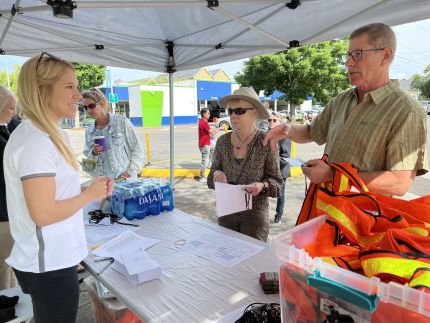Rose Festival First Aid Station Volunteer: Difference between revisions
| Line 31: | Line 31: | ||
*Review of radio protocols; | *Review of radio protocols; | ||
*Review of emergency procedures. | *Review of emergency procedures. | ||
<span style="color:#ffffff">...</span> | |||
== What to Expect: Parade Day == | |||
===Before leaving home=== | |||
Before leaving home for your volunteer shift: | |||
*Have your route from home planned. If you're driving, where will you park your vehicle while volunteering? (Recommended parking options for you will be provided via email before your shift) How much time will you need to get from your home to check in at the Coordination Center? | |||
*If you're taking the bus, plan your trip with TriMet at https://trimet.org/home/planner. | |||
*Check your equipment and make sure you have everything you want. We recommend having it prepped and ready to go the night before. | |||
*If you have a smartphone, have this article loaded up on your browser so you can reference it as needed. | |||
* Use the bathroom before you leave home. Portable restrooms will be available to volunteers near most posts, but fewer bathroom breaks minimizes the effort moving Parade Guides around to cover unstaffed barricades. | |||
<span style="color:#ffffff">...</span><p></p> | <span style="color:#ffffff">...</span><p></p> | ||
Revision as of 14:46, 7 June 2023
Volunteering at Rose Festival First Aid stations is an important part of our routine NET deployments each year. It's great community service and provides a lot of visibility for NET. Also, the stations are right on the route so first aid volunteers get a great view of the parade! First aid volunteers will also see other NETs in other positions; possibly in comms, or as Parade Guides.
The current policy is to staff each station with a minimum of three NETs with first aid training (or higher medical response qualifications).
Background
NET Volunteers serving at Grand Floral Parade First Aid stations goes waaay back...probably to the 1990s. Post-COVID, the GFP route shortened and we now deploy two first aid stations instead of five.
Mission
First Aid Volunteers help keep Portland Rose Festival events safe and fun by addressing paradegoers' minor injuries. Volunteers will help act as "eyes and ears" around the parade route and work with our on-site safety team to report any incidents. Responsibilities include:
|
Volunteer Coordination Center (VCC)
Each parade will include at least one Volunteer Coordination Center (VCC) to coordinate volunteers and their communications. The location of a Coordination Center will be included in the Operations Plan. First aid volunteers are not required to check in at the VCC; they will be checked in either when PBEM staff drops off their supplies or over 800 MHz radio.
There will be several volunteers/staff at the VCC. First Aid Station Volunteers only need to be aware of the Parade Guide Lead. This person (a PBEM staffer) effectively serves as the Incident Commander for Parade Guides. They will have an 800 MHz radio to communicate with the Portland Emergency Coordination Center (ECC). This is the person that First Aid Volunteers will primarily communicate with throughout the event, over 800 MHz.
...
What To Expect: The Operations Plan
All Parade Guide volunteers should expect to receive an electronic copy of the Operations Plan no more than three days before your shift, and a hard copy will be provided to you with station supplies. Please do not request a copy of the Operations Plan if the parade is more than three days off.
The Operations Plan is a document that has the following mission critical information:
- Parade day timeline, including check-in and check-out times;
- Location of the Volunteer Coordination Center;
- Relevant parade day phone numbers (e.g. cell phone numbers of personnel in the Coordination Center);
- Lists of required and recommended equipment;
- Review of radio protocols;
- Review of emergency procedures.
...
What to Expect: Parade Day
Before leaving home
Before leaving home for your volunteer shift:
- Have your route from home planned. If you're driving, where will you park your vehicle while volunteering? (Recommended parking options for you will be provided via email before your shift) How much time will you need to get from your home to check in at the Coordination Center?
- If you're taking the bus, plan your trip with TriMet at https://trimet.org/home/planner.
- Check your equipment and make sure you have everything you want. We recommend having it prepped and ready to go the night before.
- If you have a smartphone, have this article loaded up on your browser so you can reference it as needed.
- Use the bathroom before you leave home. Portable restrooms will be available to volunteers near most posts, but fewer bathroom breaks minimizes the effort moving Parade Guides around to cover unstaffed barricades.
...
